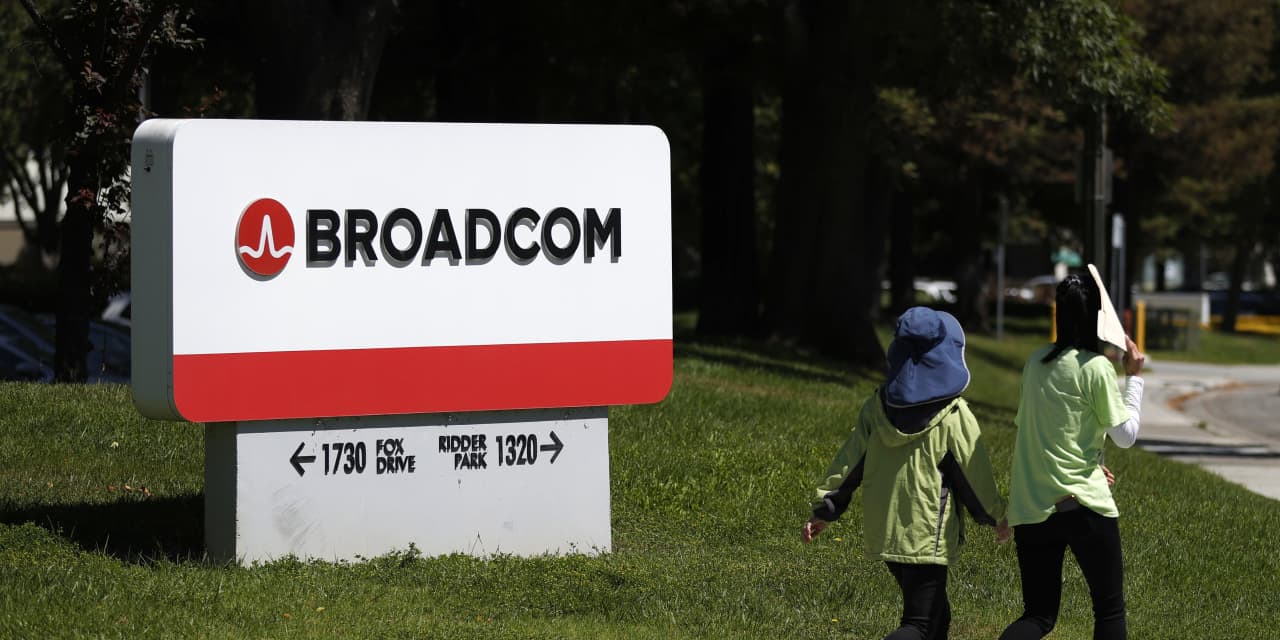Broadcom
is set to merge with
VMware
on Oct. 30, and VMware shareholders must decide what consideration they want to receive in the roughly $75 billion deal.
VMware (Ticker VMW) investors have the choice of electing to take Broadcom (AVGO) stock or cash. Given the sharp rally of 55% in Broadcom shares since the deal was unveiled in May 2022, VMware investors should opt for stock.
VMware is a maker of software while Broadcom is a leading producer of semiconductors and its shares have benefited from enthusiasm for the AI spending boom.
Those VMW holders that choose cash will receive appreciably less than the current VMware stock price. Investors who make no election likely will receive cash.
Here is the situation. VMware shares finished Tuesday at $164.35, down 0.7% while Broadcom was off 1.7% to $844.52. Broadcom is capping the equity consideration in the merger to 50% meaning that it probably will issue half stock and half cash in total to VMware holders.
VMware holders have the choice of getting 0.252 Broadcom shares now worth about $213, or receiving $142.50 in cash, for each VMware share. The blended merger price (50% stock and 50% cash) is nearly $178 per VMware share, Barron’s calculates.
With the overwhelming majority of VMware holders likely to elect stock, VMware holders who choose stock likely will get about $178 a share in value based on the current stock price. They will be prorated and get roughly half stock and cash for their VMware shares. Those who elect cash will get $142.50 a share and those who make no election likely will get a similar amount.
The value of $178 per share is a nice premium of about $13 a share above the current VMware stock price and largely reflects uncertainty about whether Chinese regulators will approve the transaction, takeover arbitragers tell Barron’s.
“We don’t think VMware’s market price accurately reflects the odds of a successful completion of the transaction,” says Roy Behren, co-manager of the Merger Fund. The spread is about 8%, which is sizable for a deal set to close in about a month and a half.
He says the opaque nature of the Chinese antitrust process is behind the wide spread, plus the huge size of the deal, which strains the capital capacity of the arbitrage community.
The arb community also is aware that Intel scrapped its deal to buy
Tower Semiconductor
in August after it failed to receive Chinese regulatory approval before the merger agreement expired. U.S.-China tensions also factor into the current VMware arbitrage spread.
Still, Wall Street appears to be putting odds of 75% or more that the deal will get done, assuming the VMware would trade around $125 to $135 if the deal doesn’t get done.
Broadcom is confident that the deal will get done. The company said in a press release on Aug. 21 that it plans to close the deal on Oct. 30.
Broadcom said it had received regulatory approvals in numerous countries and jurisdictions outside the U.S. and saw “no legal impediment” to closing the deal under U.S. merger rules. Broadcom said it’s working “constructively” with regulators elsewhere in the world and said it believes it will receive remaining required regulatory approvals by the targeted Oct. 30 closing date.
Broadcom CEO Hock Tan was asked on the company’s earnings conference call in August about whether Chinese approval is needed for the deal and didn’t answer the question.
Broadcom didn’t respond to a Barron’s query on the Chinese situation.
In an election information booklet, VMware said that the election deadline will be five business days before the anticipated closing date of the deal and that it anticipates that election forms will be due at least three business days before the deadline. Such information will be publicly announced by the two companies.
Addressing investors who hold their VMware shares with a bank or broker, VMware said: “You should promptly contact your broker, bank or other nominee and follow its instructions as to the procedures for making elections and exchanging your shares of VMware common stock in the Transaction.”
Write to Andrew Bary at [email protected]
Read the full article here




